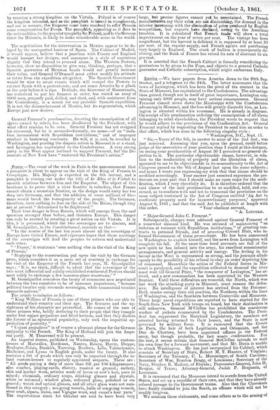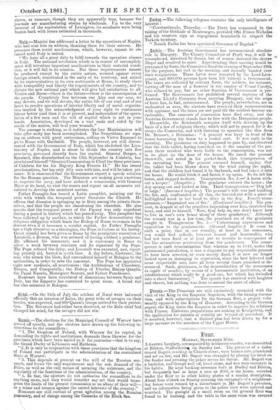ImPrint.—We have papers from America down to the 20th Sep-
tember, and a telegram to the 24th. The latter announces that the town of Lexington, which has been the pivot of the contest in the State of Missouri, has capitulated to the Confederates. The advantage thus gained, though not in itself of great importance, Lexington con- taining only 5000 people, may have serious consequences. General Fremont cannot move down the Mississippi with the Confederates advancing in Missouri, and the loss will greatly discredit him, as Lex- ington is situated within his command. He is already in disgrace. On receipt of his proclamation ordering the emancipation of all slaves belonging to rebel slaveholders, the President wrote to request that he would adhere to the provisions of the Confiscation Act. General Fremont replied by requesting the President to send him an order to that effect, which was done in the following singular style :
" Washington, D.C., Sept. 11.
" Sir,—Yours of the 8th, in answer to mine of the 2nd inst., was just received. Assuming that you, upon the ground, could better judge of the necessities of your position than I could at this distance, on seeing your proclamation of August 30 I perceived no general ob- jection to it. The particular objectionable clause, however, in rela- tion to the confiscation of property and the liberation of slaves, appeared to me to be objectionable in its nonconformity to the Act of Congress passed on the 6th of August last upon the same subjects ; and hence I wrote you expressing my wish that that clause should be modified accordingly. Your answer just received expreises the pre- ference on your part that I should make an open order for the modi- fication, which I very cheerfully do. It is therefore ordered that the said clause of the said proclamation be so modified, held, and con- strued, as to conform with and not to transcend the provisions on the same subject contained in the Act of Congress entitled 'Alz Act to confiscate property used for insurrectionary purposes,' approved August 6, 1861; and that the said Act be published at length with
this order. "Your obedient servant, " A. Lamour. " Major-General John C. Fremont."
Subsequently, charges were adduced against General Fremont of a somewhat unusual kind. He was accused of maintaining "an isolation at variance with Republican institutions," of granting con- tracts to personal friends, and of arresting Colonel Blair, who in- formed Government of these proceedings. He has been summoned to Washington to explain himself, and the news from Lexington will complete his fall. At the same time local accounts are full of the new spirit he has infused into the army, his excellent commissariat arrangements, and general activity and energy. The feeling in his favour in the West is represented as strong, and the journals allude openly to the possibility of his refusal to obey an order depriving him of command. Meanwhile the action of the Federal forces in Mis- souri is paralyzed, and the expedition collected to descend the river must wait till General Price, "the conqueror of Lexington," has ar- rived, and a new commandant has been appointed to the Western frontier. Until these difficulties are removed, the North, which was last week the attacking party in Missouri, must resume the defen- sive. No intelligence of interest has arrived from the Potomac. Both armies occupy their old position, the Northern within the lines of Washington, and the Southern between Centreville and Manassas. Three large naval expeditions are reported to have started for the South from New York with troops on board, but their destination is still unknown. General M'Cle.ilan has prohibited the murderous warfare of pickets commenced by the Confederates. The Presi- dent has suppressed the Maryland Legislature, the members not arrested having returned to their homes, 'and the State is now governed by military force. It is rumoured that the Comte de Paris, the heir of both Legitimists and Orleanists, and the Due de Chartres, have been appointed officers in the Federal army, but though probable, the fact wants confirmation. For the rest, it seems certain that General McClellan intends to wait his own time for a forward movement, and that Mr. Davis is unable to attack Washington. He hasjust reorganized his Cabinet, which consists of Secretary of State, Robert M. T. Hunter, of Virginia; Secretary of the Treasury, C. L. Memminger, of South Carolina; Secretary of War, Braxton Bragg, of Louisiana; Secretary of the Navy, Stephen R. Mallory, of Florida; Postmaster-General, John H. Reagan, of Texas; Attorney-General, Judah P. Benjamin, of Louisiana.
It is rumoured that the Mormons intend to secede from the United States, and set up a republic of their own, and that they have already refused passage to the Government trains. Also that the Cherokees have finally decided to join the South, an offence which will not be readily forgiven. We mention these statements, and some others as to the arming of
slaves, as rumours, though they are apparently true, because the journals are manufacturing stories by wholesale. Up to the very moment of the capitulation of Lexington, its assailants were being beaten back with losses estimated in thousands.































 Previous page
Previous page